Transit potential
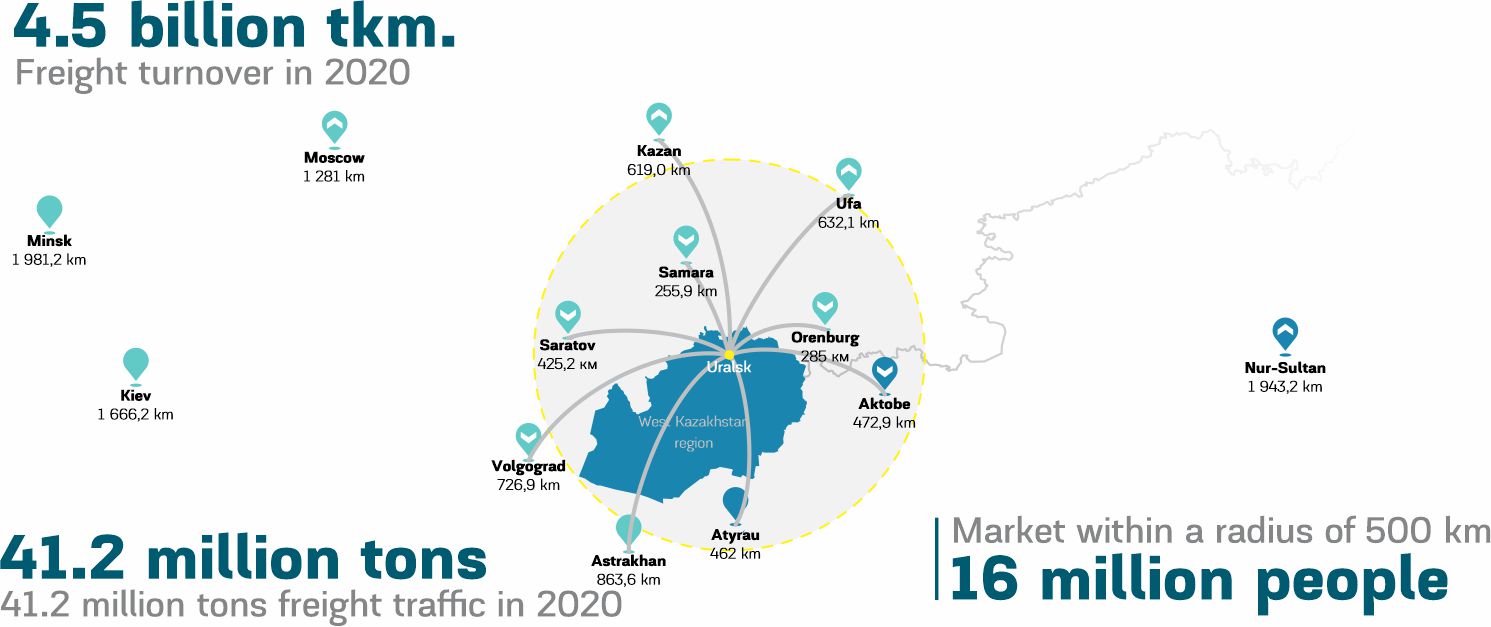
The development of transport and the formation of freight flows passing through the territory of the West Kazakhstan region are influenced by the proximity of the industrially developed Ural and Volga economic regions, the situation between the states of Central Asia and Central Russia, which exchange significant cargo flows between themselves.
The railway goes through the northern part of the region, connecting it with Russia and neighboring Aktobe region. The total length of railway tracks passing through the region is 319.7 km. The length of public roads in the region is 6469.7 km. The roads of the region are connected with the road network of the neighboring regions of the Russian Federation.
The geographical location of the Ural River at the junction of Europe and Asia, determines the peculiarity in strategic terms - the possibility of exit of the country of the Caspian basin. For navigation, the river fleet is able to transport 30–35 thousand tons of oil products, 1–1.5 million tons of construction cargo and provide passenger transportation services for up to 250 thousand people.
In addition, to date, there are reconstruction of Airport in Uralsk. The project includes increasing the terminal area from 4,000 to 10,000 m², and also supplies of external engineering networks, the organization of the parking and the improvement of adjacent territory, technological equipment modernization of terminal in accordance with international standards and requirements for border and customs controls.
“The Central Asia-Center”, “Orenburg-Novopskovsk” and “Soyuz” main gas pipelines run across the region, their length is 2,781 km, and “Atyrau-Samara” transit pipeline runs 313 km in length.
In the region, there are 26 installations of satellite communication systems, 160 ATSs with a total capacity of 81.3 thousand numbers. There are a cellular service that provide auto-testing in 66 countries of the world.
Mineral and raw material base
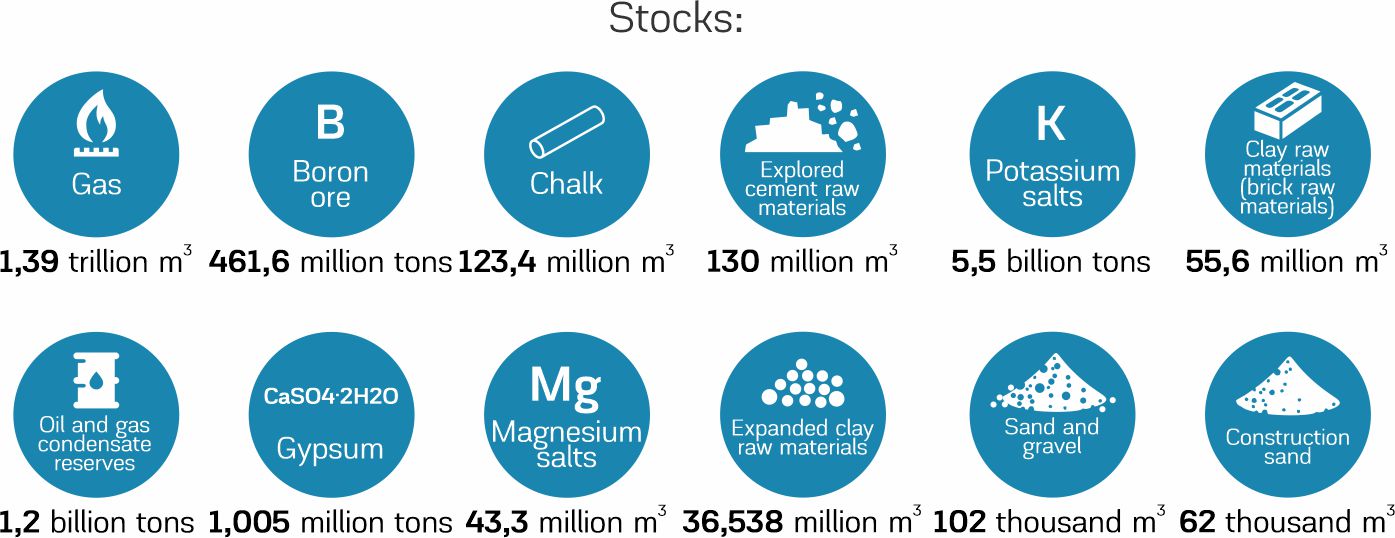
Available stocks allow them to industrial development and use for a long period. Most of the fields on which the work is being carried out are concentrated in Zelenov, Burlin, Akzhaik and Taskala districts of the region.
Bowels of the earth of the West Kazakhstan region rich in oil and gas condensate, this condensate and oil and gas fields: Karachaganak, Chinarevo, Daryinsk, Rostoshi, South Gremyachinsk, Rozhkovo, Tsyganovo, Prigranichnoye, Tokarevo, Kamenka, Ulyanovsk, Bolganmola, East Gremyachinsk, West Teplovskoe , Teplovskoe, Karpovskiy Severny, Ushkultas and Port Arthur.
In the region, exploration and production for oil and gas are conducted by 10 companies at 10 subsoil use sites, according to the contracts concluded at the Government level. KPO Companies B.V. and Zhaikmunai LLP are developing and operating the Karachaganak oil and gas condensate fields (Burlin district) and Chinarevo (Zelenov district), respectively.
One of the world's largest oil and gas land areas - Karachaganak, located near the city of Aksai. The deposit covers an area of 280 sq. km. The reserves of the field are 1.35 trillion cubic meters of gas and 1.2 billion tons of oil and gas condensate. The recoverable reserves of liquid hydrocarbons are about 320 million tons and gas over 450 billion cubic meters.
Another of the large fields is Chinarevo oil and gas condensate field, which is located near the border of Kazakhstan with Russia, its current reserves are 48.7 billion cubic meters of gas and 35 million tons of oil and condensate.
Manufacturing industry
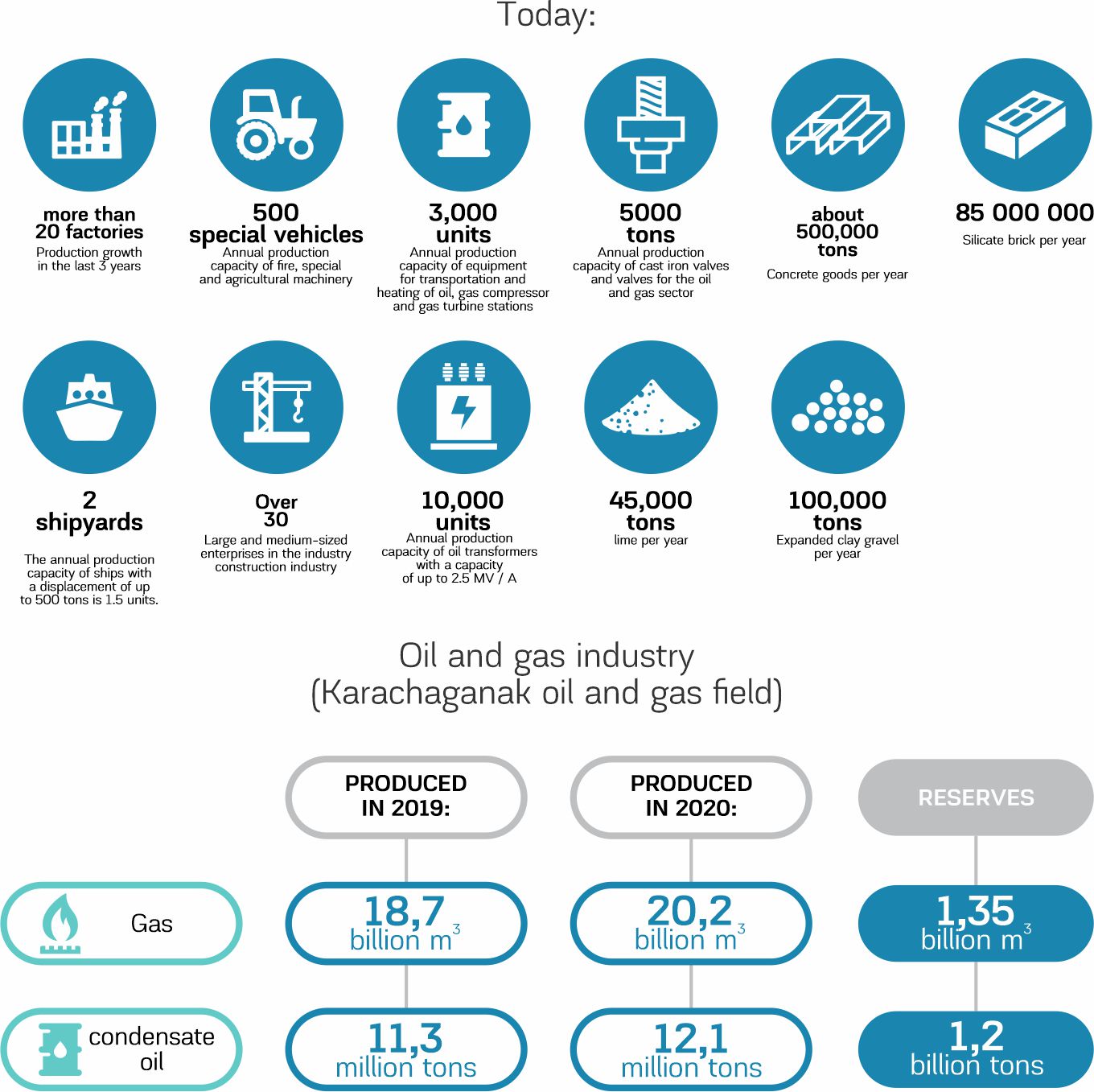
The basis of the economy of the West Kazakhstan region is industrial production, the share of which in the gross regional product is about 50%.
On a national scale, the region provides about 9% of industrial production.
Following the results of 2020, industrial products were produced in the amount of 1822.6 billion tenge, including in the mining and manufacturing industries - respectively, for 1552.0 and 205.8 billion tenge.
The index of the physical volume of industrial production amounted to 103,7%. The growth in industrial production was ensured by an increase in hydrocarbon production, in particular natural gas by 6.8%, gas condensate - by 6.9%.
Production volume since the beginning of the year was:
- gas 20 917.6 million cubic meters of gas, which is 6.8% more than in the corresponding period of 2019;
- liquid hydrocarbons (oil and condensate) – 12 362.2 million tons, which is 6.9 % more than in the corresponding period of 2019.
The decrease in production volumes in monetary terms is due to the decrease in the cost of oil.
In the manufacturing industry products were produced amounted 205.8 billion tenge, which is 4.5% less than in 2019 due to a decrease in production volumes in the metallurgy by 24.7%, mechanical engineering by 3.6%, enterprises of the foodstuff production by 2.1%, production of finished metal products except machinery and equipment by 12%. The decrease in production volumes is due to a decrease in demand for products due to the epidemiological situation, mainly by consumers from the Russian Federation.
The main bulk is accounted for by the following areas: engineering – 21,1%, food production – 38,2%, metallurgy and production of finished metal products – 14,5%.
At the same time, there is an increase in production volumes in the chemical industry - by 1.6 times, in light industry – by 2 times, in furniture industries – by 1.3%, in the construction industry – by 0.2%.
Reduced output in the following spheres is caused by:
- In the metallurgy industry by reduction of production and export of tubing on the basis of LLP “KazTrubprom” due to a decrease in demand from oil companies of the Russian Federation, such as Gazpromneft, Rostneft, Lukoil due to a reduction in production volumes in connection with the agreement adopted within the framework of OPEC; subsidiaries of "KazMunayGas" JSC»;
- In the production of finished metal products except machinery and equipment increased by decreasing in the production and export of grinding balls on the basis of LLP “KazArmaprom”, in the industry of production of finished metal products, except for machinery and equipment owing to a reduction in the production and export of grinding balls on the basis of KazArmaprom LLP through Mikhailovsky GOK JSC due to restrictive measures, metal structures on the basis of Uralvent LLP, Uralskenergostroy LLP due to a reduction in the volume of construction on the basis of KPO BV. and its contractors;
- in the oil refining industry due to the lack of raw materials on the basis of one of the major enterprises of the industry (JSC " Condensate»);
- in the machine-building industry due to a decrease in the production of crankshafts on the basis of Ural Mechanical Plant LLP, transformers on the basis of UTZ LLP due to a decrease in demand from manufacturers of the Russian Federation in accordance with the measures taken to combat the pandemic, motor special equipment on the basis of Uralskagroremmash JSC due to insufficient orders.
- in the food production industry due to a reduction in the production of milk and dairy products due to the submission of reports to Bereke-Onimderi LLP and Agroprodukt-Zhastyk LLP once a quarter due to the transition to the category of small businesses, canned meat based on Kubley LLP due to a reduced working day due to the pandemic.
Labor productivity in this industry in the end of the third quarter of 2020 amounted to $ 12, 4 thousand / person, чwhich is 7% less than in the corresponding period of 2019.
Moreover, exports in the manufacturing industry at the end of 2020 amounted to USD 138, 3 million, which is 19.2% lower than in the corresponding period of 2019. This is primarily owing to a decrease in demand from customers in the Russian Federation due to quarantine in view of the measures taken to ensure sanitary conditions. During the reporting period, almost all major exporters reduced production and exports.
Samyruk - Kazyna - Contract LLP has concluded 26 agreements with machine-building companies of WKO this year, including:
- with JSC "ZKMK" 6 contracts for the supply of tanks, electric dehydrators, buffer tanks and PVE;
- PK "Ural Foundry and Mechanical Plant" 20 contracts for the supply of spare parts, pumping units, pumps of the CNS brand.
In addition, at present, manufacturing enterprises in Samruk Kazyna Contract LLP have submitted 3 applications, of which 2 applications have been approved: Zhaik Petroleum LLP (methanol production); A.Priori LLP (production of office chairs).
The application of JSC Uralskagroremmash (production of tanks) is also being considered. Samruk Kazyna Kontarkt LLP is ready to conclude contracts from one source with the above enterprises.
In order to increase production volumes, increase labor productivity and promote exports, work is underway to clarify the main support mechanisms within the framework of state programs, including to reimburse part of the costs of exporters and to support measures aimed at increasing labor productivity through the JSC "Kazakhstan Center for Industry and Export" QazIndustry ".
According to the results of 2020, 4 online meetings were held with the participation of industrial enterprises of the region and JSC "Kazakhstan Center for Industry and Export "QazIndustry" to clarify the main mechanisms for supporting exporters.
Also, the meeting was held with representatives of the JSC" Kazakhstan center of industry and export "QazIndustry" on that subject in period from September 30 to October 1 of this year in WKO. During the visit, representatives of" QazIndustry " visited 9 industrial enterprises of the region.
Based on the results of the events in 2020 68 applications from 12 enterprises were sent to reimburse the costs of promoting domestic processed goods (on the foreign market).
Of these, 48 applications were approved from 8 companies (Agrotras, Poyma May combines, UTPK, Kubley, housing and communal services, Beles Agro, Nitrogen Plant, Bread and Dairy Plant No. 1) for a total amount of 153.1 million tenge..
17 applications from 6 companies were sent to provide support in terms of increasing labor productivity, of which 2 applications from 2 companies were approved (Kubley, Topan).
Currently, the West Kazakhstan region is on the 3rd place by the number of submitted applications, the approved projects on the 3rd place in the republic.
Also, in order to support domestic producers in December 2019, a meeting was held with representatives of the Branch of JSC Euroconsultants S.A. - BranchofKazakhstan ", JSC" Kazakhstan center of industry and export "QazIndustry" to explain the project for the development of equipment suppliers.
26 enterprises from the West Kazakhstan region applied for participation in the project, of which 14 WKO companies were selected for cost recovery following the implementation of international standards API, ASME from 70 to 90%.
Within the framework of the Business Support Map of the region in the III five-year plan (2020-2025), 15 projects are being implemented for a total of 175.6 billion tenge with the creation of 838 permanent jobs.
Of these, 4 projects totaling 4.9 billion tenge were put into operation in 2020, 148 jobs were created:
1. "Poultry farm expansion" (Ural Poultry Farm LLP»);
2. "Production of panel radiator for transformer with a capacity of 35-500 kV" (Ural Transformer Plant LLP»);
3. "Shop for processing hides" (LLP «Кублей»);
4. "Production of personal gas analyzers" ("IntelligentProtectiveSystem" LLP»);
In 2021, it is planned to launch 5 projects with a total cost of 8.7 billion tenge with the creation of 364 jobs::
1. " Construction of a furniture factory "( (LLP «Квант»);
2. "Construction of a brick factory" (LLP «134»);
3. "Dairy farm" (Ringo-Milk LLP»);
4. "Construction of a plant for the production of semi-trailer equipment" (BATYSTRAILER LLP»);
5. " Production of solar panels " ("GreenSparkLimited" LLP).
Agroindustrial complex
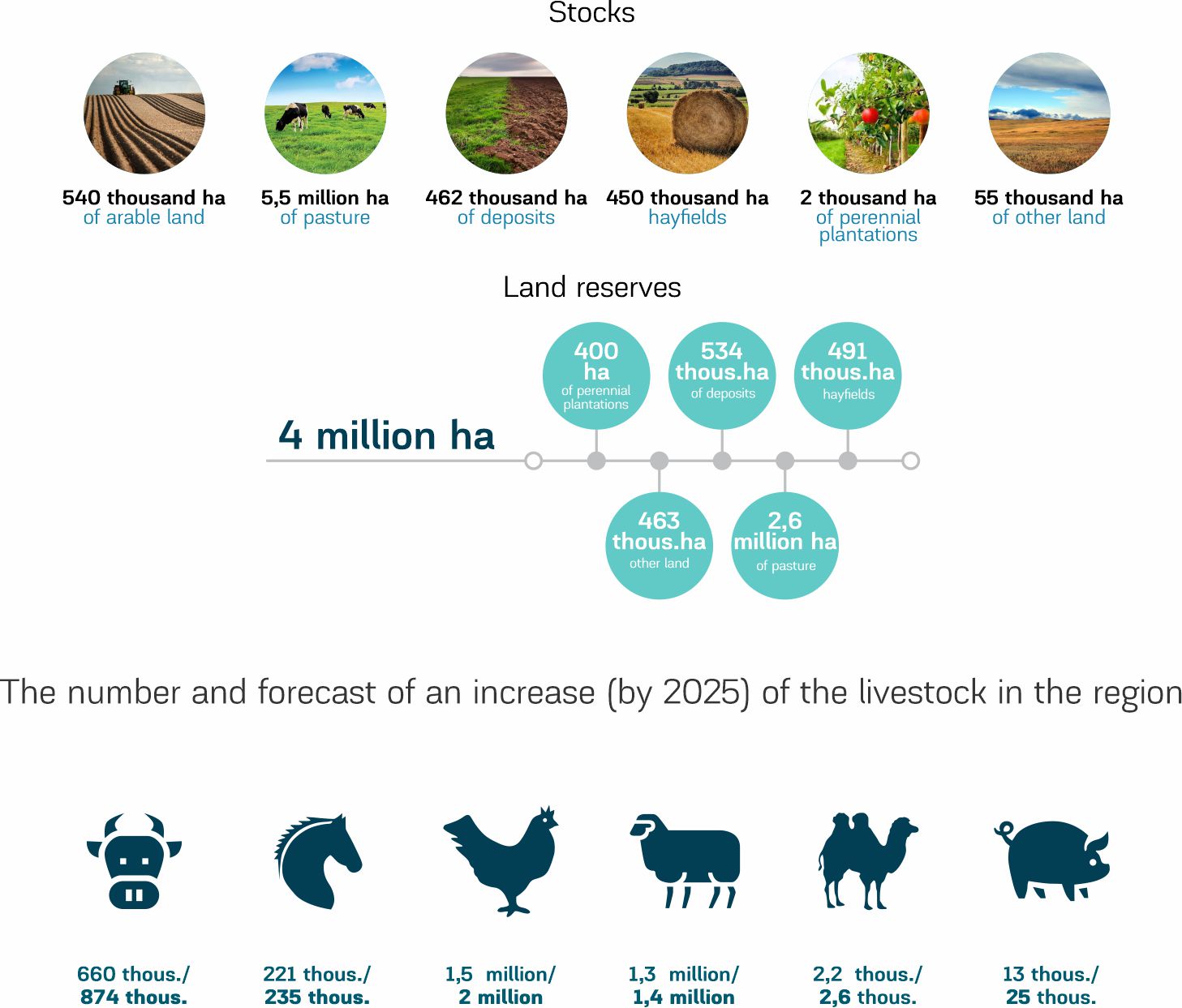
In the message of the President, the agricultural sector is defined by a new economic driver, which has a promising future.
Agriculture traditionally specializes in the production of grain and livestock products. In plant growing, along with grain, oilseeds, cereal crops are grown, potatoes, vegetables, melons and fruits are produced. For the development of grain production, the region has the necessary land resources. In the most favorable agricultural zone, there is about 1 million hectares of a fertile deposit for farming. The natural and climatic conditions of this zone make it possible to grow hard and strong wheat varieties with high protein and gluten content, which are in high demand in the world market. In animal husbandry, the main industries are cattle and sheep, additional: pig, horse, camel and poultry. The presence of 12.4 million hectares of pastures and hayfields in the central and southern part of the region allows, along with large cattle, to develop camel breeding, horse breeding, and sheep breeding and produce large quantities and low costs of meat, wool and leather raw materials.
As part of the “the State Development program of agro-industrial complex on 2017-2021” program, the amount of state support in the form of subsidies and soft loans is increasing annually. As a result, in 2020, gross agricultural production in 2020 amounted to 200291, 3 million tenge.
In the field of agriculture, 2 investment projects worth 6.8 billion tenge were implemented, about 100 workplaces were created.
The average yield of grain crops in 2019 was 9.9 centners per hectare and in 2020, 12.9 centners per hectare.
In 2020, more than 2,000 tons of meat and meat products were exported.
The Law “On Cooperation” is effectively implemented in the region, where 205 cooperatives have been created (193 - animal husbandry, 12 - crop production).
In the structure of agricultural products, households produce 57.2% of vegetable production and 52.5% of livestock production, while 42.8% and 47.5%, respectively, of peasant (farmer) farms.
In the region there are more than 76.6 thousand farmsteads engaged in the breeding of farm animals. This year, the task is to unite more than 900 farmsteads in agricultural cooperatives.
This will increase the level of processing of products, creating an effective system of storage, transportation and marketing of goods, and it is necessary to use the potential of personal subsidiary farms by combining them into cooperatives. Due to these measures, the share of processing of meat products will have to be increased from 32.0% to 35%, milk from 31% to 37%;
Today, the average workload of a meat processing plant is 63%, milk - 8.3%. To increase the workload of the enterprise up to 70% and 30%, respectively, it is necessary to organize service and procurement centers based on cooperatives.
Building Industry
Production volumes from 2016 to 2020
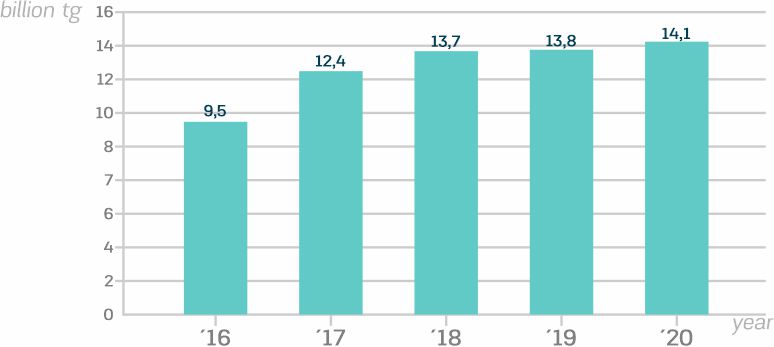
Analysis of the development of the construction industry in the region over the past 5 years shows that in this industry for the specified period, there is a positive dynamics of development.
Production volumes from 2016 to 2020 increased from 9.5 to 14.01 billion tenge.
According to the results of 2020, construction industry enterprises produced products in the amount of 14.1 billion tenge, or 100.2%. The growth was achieved due to an increase in the production of silicate bricks on the basis of JSC "ZKKSM" and ready-mixed concrete on the basis of "Stroykombinat" LLP.
On the basis of the industry enterprises, new production technologies are being developed. For example, Stroykombinat LLP has installed equipment that allows automatic control of the technological process of firing expanded clay. The project implementation allowed automating the production process, as well as reducing gas consumption and improving the quality of expanded clay gravel.
Equipment for automatic weighing of inert materials with video recording and storage in the database is also installed. The introduction of this project made it possible to automate the accounting of the receipt and dispatch of goods, as well as to monitor the quantity and quality of the delivered material in a timely manner.
Glass Service LLP has automated production of tempered glass products. Over the past 11 months of 2020, the volume of exports in this industry amounted to 3 thousand US dollars (Over the past 11 months of 2019 - 0, 03 thousand US dollars). Produced by enterprises of the industry products are mainly focused on the needs of the domestic market.
Today, a significant market share is imported products. Currently, the region fully imports cement, floor coverings (linoleum, parquet, laminate), paints, thermal insulation materials, polymer products, etc.
Over the past 11 months of 2020, the volume of imports of construction materials amounted to 853, 1 thousand US dollars and increased 1.3 times (Over the past 11 months of 2019 - 670, 5 thousand US dollars).
Tariffs for legal entities

